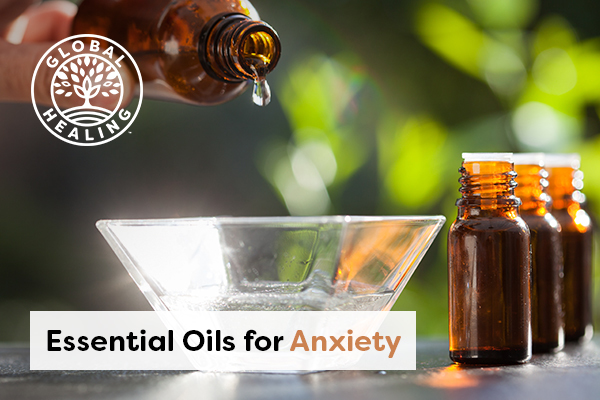
"Stop and smell the roses" is one of the most famous sayings of all time, yet did you know that there’s medicine in those words? Delightful floral aromas bring joy, peace, happy memories — and even good health. Whether rose, lavender, or ylang-ylang, essential oils can bring you relief for daily stress and anxiety.
Jennifer B., a writer from Wisconsin, discovered how beneficial essential oils could be firsthand. In 2007, as a newlywed, she learned her husband was in the path of a tornado — and she wasn’t home to help. She had a panic attack, bursting into tears. Knowing that this strong reaction wasn’t unusual for her, she became determined to find a natural way to help her relieve anxiety. It took several years to find something that helped.
"After surgery years later, the nurses gave me an essential oil scented packet to smell when I felt nauseous or anxious," Jen says. It was a blend of peppermint, lavender, ginger, and spearmint oils. When she inhaled, it instantly made her feel calm, clear, and centered. "It helped, so I adopted the idea into my own natural medicine toolkit."
Today, she has a collection of oils to use whenever she wants some relief from daily stress and anxiety.
What Are Essential Oils?
Essential oils concentrate the scent and flavor of a plant.[1] Oils can concentrate the floral essences, or aromatic compounds in the leaves or roots, depending on the plant. The plant material gets either mechanically pressed or distilled, concentrating the aromatic chemicals into a powerful liquid package.
Essential oils have various health benefits. These range from strengthening the immune system to reducing inflammation to helping you relax.[2]
People commonly use essential oils in cosmetics, food, and natural medicine.[2] They’re best known for aromatherapy — using scent to improve the health of the body, mind, and spirit.[3]
You can disperse the oils through a diffuser, inhale right out of the tiny bottles, or apply the oil to your skin, usually with an unscented carrier oil. If they’re food-grade, you can take them internally.
Top Essential Oils for Anxiety
Essential oils have an amazing ability to promote your mental health and wellness — specifically, calming down an anxious mind. We’ve compiled the best serenity-boosting oils out there. Grab a deep breath and enjoy anxiety relief!
Bergamot
A citrus fruit about the size of an orange, bergamot is the key ingredient in Earl Grey tea. Bergamot helps you calm down when there’s just too much going on. Bergamot not only protects the brain and helps your brain cell "synapses" or connections work better, but it also has remarkable anxiolytic or anxiety-calming properties.[4]
Lavender
Lavender essential oil comes from tiny purple flowers you can find across the Old World, like the English countryside. The oil has a wealth of benefits, including antibacterial to antifungal properties. But lavender oil shines as a way to calm you down — it even eases the blues and relaxes muscles.[5]
Rose
Many people associate the floral scent of a rose with love and joy — and it’s no different with rose essential oil. Rose oil contains terpenes, flavonoids, and anthocyanins — plant compounds that have numerous health benefits.[6] Rose oil can not only lift mood, but also relax your mind, reduce anxiety, and even improve sexual function![6]
German (Blue) Chamomile
The oil from German chamomile (Chamomilla recutita) contains a higher concentration of chamazulene, an aromatic compound with a distinctive blue color and strong calming effect.[7, 8] For people who generally feel a little scattered or on-edge, German chamomile can provide peace of mind.
Neroli or Bitter Orange
As another citrus-derived oil, neroli is extracted from bitter orange tree blossoms. "Neroli" is named after a 16th-century princess, Anna-Marie de Nerola.[9] Neroli oil contains limonene and linalool, which act as sedatives.[9]
When you inhale neroli oil, it can ease a grumpy mood, and even help you fall asleep with less trouble. It’s especially helpful for postmenopausal women dealing with stress and anxiety.[10]
Frankincense
You may know frankincense as one of the gifts from the three wise men. This pine-scented oil comes from the sap of the Boswellia tree. Frankincense oil promotes normal levels of stress hormones. It may also help you rest better, especially if you haven’t gotten enough sleep lately.[11]
Clary Sage
Clary sage is not the herb you’re used to cooking with. It’s a greenish-purple large-leafed plant that, when distilled into oil, works wonders for tension — especially in women. It eases cramps — a source of stress for any woman — and regulates cortisol (or "stress hormone") levels.[12]
Sweet Orange
Aromatherapists love sweet orange essential oil. They use it before and during a massage to help calm patients down. And science backs it up. When inhaled, sweet orange oil increases feelings of tranquility. It makes you feel more relaxed when dealing with a situation that brings about stress.[13]
Holy Basil
Also known as tulsi (Ocimum sanctum), holy basil has been used from ancient times as an Ayurvedic herb. Tulsi may protect cells from stress caused by chemical pollutants and heavy metals. It also physiologically relaxes your body and mind.[14] Whether as an essential oil or a liquid extract, tulsi lifts mood, promoting relaxation and happier thoughts. It may even give you an extra memory boost.[14]
Ylang-Ylang
This oil originates from the flowers of the Indonesian Cananga odorata, a tropical tree with curling yellow flowers. When taken topically, ylang-ylang oil promotes normal blood pressure, which relaxes you and makes you feel calmer.[15]
Anxiety Relief Oil-Blend Recipes
Whether used topically or diffused into the room, essential oils provide a steady, relaxing aroma that can bring calm and peacefulness. For the best results, use a diffuser. Diffusers mix the oils with water, slowly filling a room with mist. This results in the oils permeating the air, and the effects can last for several hours.
Topical Recipes
For these topical recipes, mix one or two drops of each essential oil with almond, jojoba, or coconut oil for a carrier oil. Massage the mixture directly on your wrist, neck, or temple with a cotton ball so that they absorb readily into the bloodstream. Carrier oils are unscented oils that, when blended with more volatile essential oils, make it safe to put the essential oils right on the skin.
Stay Focused Blend: Bergamot & Lavender
This blend is a one-stop-solution for anyone who feels like they have too much going on. Bergamot and lavender both help you relax enough to get in the mindset of getting things done.
Muscle Tension Blend: Clary Sage, Lavender & Bergamot
This blend will have you feeling relaxed longer thanks to both the calming properties of bergamot, lavender, and clary sage’s abilities to ease muscle tension in your body.
Diffuser Recipes
Put three drops of each oil into your diffuser. Adjust the amount used based on your diffuser’s capacity. Typically, diffusers hold 100 to 150 milliliters of water.
Relaxation Blend: Lavender, Blue Chamomile & Ylang Ylang
The chamomile in this blend will help you feel more put together and less scattered. The lavender will ease you into a relaxed state. And the ylang-ylang will calm a hectic heart rate and promote normal blood pressure.
Tranquility Blend: Orange & Cedarwood
Both orange and cedarwood soothe your mood, leaving you feeling more tranquil, relaxed, and at peace with the world no matter what is going on around you.
Precautions & Side Effects
Always use essential oils from a reputable company. Make sure you do your research for company reviews and check the ingredients list. When you do get a good, high-quality oil, be careful how you use it. Some, like bergamot, can be toxic to pets, so keep them out of the room when you have it in a diffuser.
Many essential oils should be diluted with a carrier like almond or jojoba oil before putting it on your skin. Do a test patch on your skin to make sure you won’t have an allergic reaction to the oil. Only ingest an oil if it is food-grade.
Points to Remember
Essential oils are concentrated versions of plants and all the powerful healing benefits that come with them. You can diffuse them, use them topically, or if food-grade, ingest them.
The best oils to calm your stress and anxiety are lavender, rose, neroli, bergamot, blue chamomile, ylang-ylang, frankincense, sweet orange, holy basil, and clary sage.
Lavender relaxes your muscles and calms you down. Rose lifts your mood. Neroli banishes grumpiness. Bergamot and blue chamomile help focus a scattered mind. Ylang-ylang promotes normal blood pressure, which is relaxing enough all its own.
Frankincense and clary sage both support normal levels of the stress hormone cortisol. As for sweet orange and holy basil, they’re great at bringing a sense of tranquility.
Though these are the top essential oils, others experience peaceful emotions from lime, patchouli, geranium, rosemary, peppermint, and vetiver oil.
In addition to using these oils as aromatherapy by inhaling them or using them in a diffuser, you can apply to the skin for anxiety relief. Many essential oils are found in natural cosmetics. Luminous luxury skin cream promotes fresh, radiant skin with the use of neroli, rose, and lavender essential oils, among other natural ingredients.
References (15)
- Essential Oils. National Institute of Environmental Health Sciences. Updated 1 Oct 2019. Accessed 18 Feb 2020.
- Firenzuoli F, et al. Essential oils: New perspectives in human health and wellness. Evid Based Complement Alternat Med. 2014;2014:467363.
- Aromatherapy With Essential Oils (PDQ®)–Patient Version. National Cancer Institute. Updated 7 Nov 2019. Accessed 18 Feb 2020.
- Rombola L, et al. Bergamot essential oil attenuates anxiety-like behaviour in rats. Molecules. 2017 Apr 11;22(4).
- Malcolm BJ, Tallian K. Essential oil of lavender in anxiety disorders: Ready for prime time? Ment Health Clin. 2018 Mar 26;7(4):147-155.
- Mohebitabar S, et al. Therapeutic efficacy of rose oil: A comprehensive review of clinical evidence. Avicenna J Phytomed. 2017 May-Jun; 7(3): 206-213.
- Srivastava JK, et al. Chamomile: A herbal medicine of the past with bright future. Mol Med Rep. 2010 Nov 1;3(6):895-901.
- Amsterdam JD, et al. A randomized, double-blind, placebo-controlled trial of oral Matricaria recutita (chamomile) extract therapy for generalized anxiety disorder. J Clin Psychopharmacol. 2009 Aug;29(4):378-382.
- Suryawanshi JAS. An overview of Citrus aurantium used in treatment of various diseases. Afr J Plant Sci. 2011 Jul;5(7):390-395.
- Choi SY, et al. Effects of inhalation of essential oil of Citrus aurantium l. var. amara on menopausal symptoms, stress, and estrogen in postmenopausal women: A randomized controlled trial. Evid Based Complement Alternat Med. 2014;2014:796518.
- Okano S, et al. The effects of frankincense essential oil on stress in rats. J Oleo Sci. 2019;68(10):1003-1009.
- Babar A, et al. Essential oils used in aromatherapy: A systemic review. Asian Pac J Trop Biomed. 2015 Aug;5(8):601-611.
- Goes TC, et al. Effect of sweet orange aroma on experimental anxiety in humans. J Altern Complement Med. 2012 Aug;18(8):798-804.
- Cohen MM. Tulsi - Ocimum sanctum: A herb for all reasons. J Ayurveda Integr Med. 2014 Oct-Dec;5(4):251-259.
- Hongratanaworakit T, Buchbauer G. Relaxing effect of ylang ylang oil on humans after transdermal absorption. Phytother Res. 2006 Sep;20(9):758-763.
†Results may vary. Information and statements made are for education purposes and are not intended to replace the advice of your doctor. If you have a severe medical condition or health concern, see your physician.







